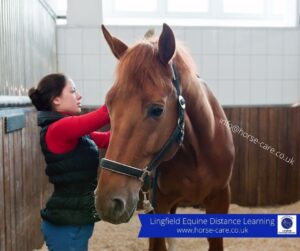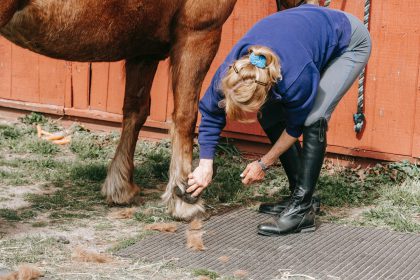Is your offspring aiming to work with horses? Are you a mature person wanting to work with horses?
One of the most common enquiries I receive these days here in the Lingfield Admin office is from parents asking for information about courses for their young daughter or son who wants to work in the equine world.
The second most common enquiry comes from adults wanting to know how to gain riding instructor qualifications – or coach qualifications as they are more commonly known today.
If your young person still of school age or too young for college there are options for learning and and for training which are not always identified by schools as career paths. College isn’t for everyone – it depends also on your situation – this is especially the case if college is too far away, out of reach academically, or just not suitable for your personal situation. Perhaps as a parent you would prefer your daughter or son to stay closer to home for a bit longer? The information below is given with mainly the young person in mind, but equally applies to mature people as well. Work Based Training and Work Experience:
Had you considered looking into training whilst working within the industry at a commercial yard? Even a good local livery yard might be the place to consider. This way you don’t have to attend college. For the mature person with a family, horse and a life already full as well as for the younger person – it is often more suitable to live at home and train in the local region where they live. The mature person may be able to arrange this training on a part time basis in exchange for work perhaps. The under 18s may well find this a useful route for a future career.
The yard need not necessarily be a ‘training yard’ but it does need to be somewhere that takes on or is prepared to take on youngsters or trainees to work and train at the same time. The yard owner needs to be prepared to offer some form of training – either from an outside instructor/coach or by themselves giving some form of training during the working week. If the Yard Owner/Manager is not qualified, an outside local instructor can often be hired to oversee and offer formal training once or twice a week.
Sometimes it is possible to arrange an official work experience situation for young people. Often this can lead to a trainee position. Work experience is a really good way of testing the water. The yard does not gain funding for work experience but it is good business practice and good for the local community too. However the Yard Manager must be aware of the implications for safety in work experience situations. Lingfield Equine Distance Learning along with our partner The Livery List website has information for Yard Managers on this and many other related issues
This sort of work based training discussed here would probably be best arranged under an official apprenticeship scheme if possible. This, admittedly is not going to earn the student / trainee / employee much money, but the training (providing you find the right place) will be better for some young people than going off to college for a year. It is probably a lot cheaper too – even if you have to use taxi’s to get your young person too and from work sometimes. Those extra and seemingly extravagant expenses have to be considered, but they are part of the ‘training’ process and route you may need to take to achieve that final goal of a qualification.
An apprentice’s wage should not be thought of as a full working rate of pay – it simply isn’t, it is trainee’s pay rate. It might be thought of as a bit of pocket money – but should be considered also as being better than having to pay for training. For the young person it is ‘their’ money and well earned. This sort of training does help to teach the young person a work ethic too. Furthermore it makes them realise that if you work in a ‘hands on’ capacity in the equine industry, the hours are long and the work is hard and the pay as a rule is pretty minimal. The place of work however IS a work place and he or she is therefor considered to be employed with all the benefits that comes with.
It is hard work and early mornings – which young teens are quite often not so good at. If they are motivated and keen however, they should get on well. If not so motivated, they tend to hate the long hours and ‘having’ to be there at say 7am. For this reason many fall by the wayside after a year or so, but that ‘world of work’ experience is sometimes better for some of them than spending a wasted year at college before deciding it is not for them. Training Companies / Providers:
There are training companies (example links given below) which oversee apprenticeships and training at smaller yards. They also handle or oversee training at some of the smaller colleges to. I suggest getting on to their websites to look at the options. Look the website links both from the employers point of view (the employers sections) and the student’s/trainee’s point of view to get an overall picture. The sites usually have vacancies advertised as well.
I would suggest also you contact any yard you know locally which is reasonably well run and approachable. Ask if they would consider – with support from a national training company – taking on a youngster, or mature person for that matter, for training through the National qualification Levels. They may not be up to speed on those but the links below give training providers who handle that side of it for them.
If they have not yet considered taking on a young person as a trainee/apprentice they might do if they knew that the actual qualification system is arranged by a training company rather than them having to organise it. The Training Provider gets funding from the government to set this up with the yard. The yard could also and they may not be aware of this – get government funding for taking on an apprentice. Qualifications:
The qualifications to aim for are the National Level 1 & 2 British Horse Society Stage 1 & 2,
or if training with an Association of British Riding Schools yard the (no membership required by trainees) UK Coaching Certificates Levels 1 & 2 come under the jurisdiction of the British Equestrian Federation, and are accredited by First 4 Sport. Holders of Level 2 qualify for an International Trainers Passport.
Whoever you approach about training make it plain that you are looking eventually for one of those 3 National qualifications. You do however, need the relevant structured training towards final national assessments – not just general training on the yard for yard work and managing horses.
Be aware that although many only know one route for training in this industry, today you do not necessarily need to search only for BHS qualifications – but they are good and well recognised but very strictly structured and you have to work up from the bottom to gain them. No hands on qualifications in this or any other country can be gained by distance learning – but Lingfield can provide the theory knowledge which is the backbone of any assessment system and during assessments trainees are questioned on that knowledge.
The information relevant to the theory knowledge on which trainees would be tested is the Lingfield Intermediate Diploma programme.
We used to have a system of ‘working pupils’ in the UK before apprenticeships came into the industry some years ago. The system worked very well but there were some employers (then and now) who will always take advantage of youngsters and do not provide the proper and structured training they should do. With the training companies/provideers such as Haddon and Keats involved in apprenticeships however training is much more organised.
I realise our course work might be harder for younger people to study owing to lack of diagrams and guidance on the practical front but can assure you that the theory is more comprehensive than most college courses at the same level and is more than required by most taking professional exams/qualifications. Training links
Here is one example of a training provider which arranges training on yards in parts of England. https://keits.co.uk/hire-an-apprentice
There are others but you would need to search on the net for them in various areas of the country.
Alternatively go to the gov website and find a provider. The link given below is for employers really but it would hopefully bring up training companies in your area. In general the training companies listed do not actually do the training in outlying yards – the yard organises that. The training company however oversee the training and handle the paperwork involved. The training providers employ professional trainers as assessors who visit the yards to check progress and to check the student/apprentice training is to the correct standard. https://www.gov.uk/employers-find-apprenticeship-training
I really hope this has been of assistance and helps you make the right choices. It is a huge step and it needs to be the right route. What the young person ultimately hopes to do should have a bearing on what route you choose for them too.
It is really important to understand that there are some courses and qualifications which just do not provide the right outcomes and after two years of college the student often realises this – at which time people have to change to another course just to get where they want to be or paying for other more suitable exams on top of the National Levels. Changing course often means starting at the bottom again so it is really important to find the right path for the outcome the young person believes at this stage they want. What to do first:
Establish what you want to do or what the young person really wants to do in the end after they qualify. Is it for instance, training horses, teaching people to ride or do they hope to become a professional groom etc.
If the interest is within a specific discipline – such as eventing or showjumping or dressage – there are other routes which are far more suitable. These are however, not so easy to access. These are generally via specific specialist riders and producing yards and not within our remit here at Lingfield.
I would greatly appreciate it if you would be let me know if this information has been of benefit. The outcome of your continued searching and research along with your ideas on what was useful and what was not as well as the final outcome for your choice would be really good to know. We get plenty of similar enquiries but it would be good to have a bit of feedback from parents sometimes about this sort of thing so that others can be provided with more help. Paula Clements



Receive latest news and industry insights straight to your inbox.